Ear infections are a common health issue for dogs, causing irritation, discomfort, and pain. As a dog owner, you may wonder – can my dog's diet be causing these pesky ear infections?
The short answer is yes, certain ingredients in dog food can contribute to ear infections in canines. Food allergies and poor-quality ingredients are two ways dog food is often implicated in ear infections.
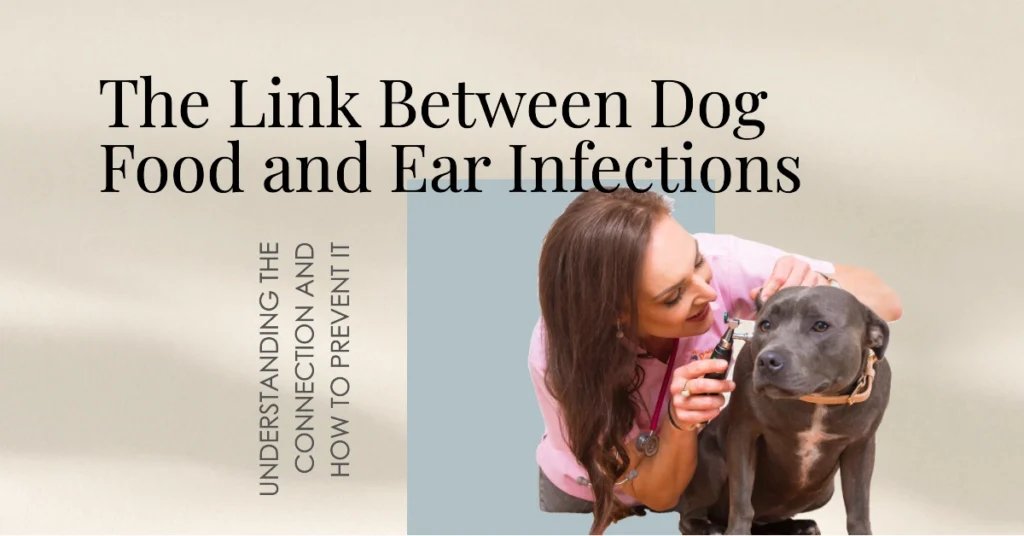
- Understanding Ear Infections in Dogs
- How Food Allergies Lead to Ear Infections
- How Dog Food Quality Affects the Ear Canal
- Tips for Preventing Food-Related Ear Infections
- Here's something to consider: Could lesser-known factors in dog food cause ear infections?
- What are the symptoms of ear infections in dogs?
- What are the treatment options for ear infections in dogs?
- The Bottom Line
In this article, we'll explore the connection between dog food and ear infections, looking at:
- How food allergies trigger ear infections
- How poor quality dog food affects the ear canal
- Tips to prevent and treat food-related ear infections
Understanding Ear Infections in Dogs
Dogs often suffer from ear infections which can be painful and uncomfortable. There are three types of ear infections: infection in the outer ear, middle ear, and inner ear.
Otitis externa is the most common type. It happens when the external ear canal gets inflamed. This inflammation is caused by yeast, bacteria, or both.
Although some breeds are more susceptible to ear infections, they can occur in any breed. If someone has an ear infection, they may shake their head, scratch their ear, and have dark discharge. The ear may also be red, swollen, painful, itchy, and have crusts or scabs.
If your dog shows any of these signs, it's important to see a vet for diagnosis and treatment. Eating healthy food helps prevent ear infections in dogs.
How Food Allergies Lead to Ear Infections
Allergies are a major cause of ear infections in dogs. Up to 10% of all canine allergies are food-related.
Common food allergens for dogs include:
- Protein sources: Beef, chicken, lamb, fish, eggs, dairy
- Grains: Corn, wheat, soy, rice
- Additives: Preservatives, colorings, flavorings
When a dog eats a food they are allergic to, it triggers an immune response. The dog's body sees the proteins in the food as “invaders” and releases antibodies to attack them.
This immune reaction causes inflammation throughout the body. For dogs, allergic inflammation often targets the skin – especially the ears.
Here's why allergic dogs tend to get itchy, irritated ears:
- The ear canal has a thin layer of skin that is very sensitive to inflammation
- Dogs will scratch, rub, and lick at their itchy ears, which further irritates the skin
- Moisture gets trapped in the ear canal, creating the perfect environment for bacteria and yeast
As microbes multiply, infection develops in the weakened ear canal. Outer ear infections (otitis externa) are most common, causing pain and swollen ear flaps.
For dogs with chronic food allergies, back-to-back ear infections are not uncommon. The itch-scratch cycle keeps re-damaging the irritated ear canal.
Takeaway: Food allergies promote inflammation and skin irritation, especially in the ears. This allows bacteria and yeast to take hold, resulting in infection.
How Dog Food Quality Affects the Ear Canal
Aside from causing allergic reactions, poor-quality dog food can compromise the health of your dog's ears.
Here's a quick anatomy refresher:
- The outer ear includes the ear flap (pinna) and ear canal. This is lined with hair follicles and wax-producing glands.
- The middle ear contains the eardrum and small auditory bones. This is connected to the throat by the Eustachian tube.
- The inner ear houses the cochlea and vestibule organs which control hearing and balance.
| Ear Section | Role |
|---|---|
| Outer | Catches soundwaves, protects canal |
| Middle | Transmits vibrations to inner ear |
| Inner | Sensory organs for hearing and balance |
The outer and middle ear sections are most vulnerable to infections. The outer ear canal in particular is prone to irritation.
Here are some ways poor nutrition affects the health of a dog's ear canal:
Weakened immune function
- Poor-quality proteins, fats, vitamins, and minerals impair immune cells and antibodies.
- This allows the overgrowth of bacteria and yeast when the ear canal is irritated.
Altered pH balance
- Changes to the body's optimal pH make earwax too alkaline or acidic.
- Yeast and bacteria thrive in abnormal pH levels.
Reduced wax production
- Low fat diets or deficiency in zinc or vitamin A can reduce production of protective earwax.
- This eliminates the ear canal's natural defense against microbes.
A species-appropriate diet supports the immune system, pH balance, and natural defenses of a dog's ears. Without proper nutrition, the ear environment is more welcoming to infection-causing microorganisms.
Takeaway: Low quality ingredients can compromise a dog's immunity, pH levels, and wax production. This increases vulnerability of the ear canal to infections.
Tips for Preventing Food-Related Ear Infections
If you suspect your dog's ear infections are food-related, here are some tips:
| Tips | Description |
|---|---|
| Try an elimination diet | Removing all common allergens and novel proteins may help identify the culprit. Lamb, duck, kangaroo, and exotic meats are gentle options. |
| Choose a hypoallergenic formula | Hydrolyzed protein and novel carb sources reduce risk of reactions. |
| Go grain-free | Grains like corn, wheat, and soy are frequent allergens. Try a carb-inclusive diet without grains. |
| Examine all ingredients | Avoid additives like fillers, preservatives, and artificial flavors which can trigger allergies. |
| Rotate proteins | Switching between 2-3 protein sources may help reduce reactions. |
| Supplement with omega-3s | Omega-3 fatty acids help reduce inflammation and promote skin health. Consult your vet on a fish oil supplement. |
| Improve ear hygiene | Gently cleanse ears weekly with a vet-recommended solution to prevent infection. |
| See your veterinarian | For chronic or severe infections, your vet can provide prescription medications and diet tips. |
With some adjustments to your dog’s diet and ear care routine, you can get those pesky ear infections under control. Pay attention to any reactions after meals or treats. Keeping a food journal can help identify triggers.
Here's something to consider: Could lesser-known factors in dog food cause ear infections?
Let's continue to explore this topic together for the well-being of our furry friends.
To avoid ear infections in dogs from food allergies, give them a diet without allergens or grains.
To prevent infections, regularly clean and keep your ears dry.
It is crucial to consult a veterinarian for advice that is tailored to your dog's specific needs.
Ear infections can be caused by many things, like allergies, hormones, nutrition, autoimmune diseases, and wax buildup.
What are the symptoms of ear infections in dogs?
Ear infections in dogs can be painful and uncomfortable. Some common symptoms of ear infections in dogs include:
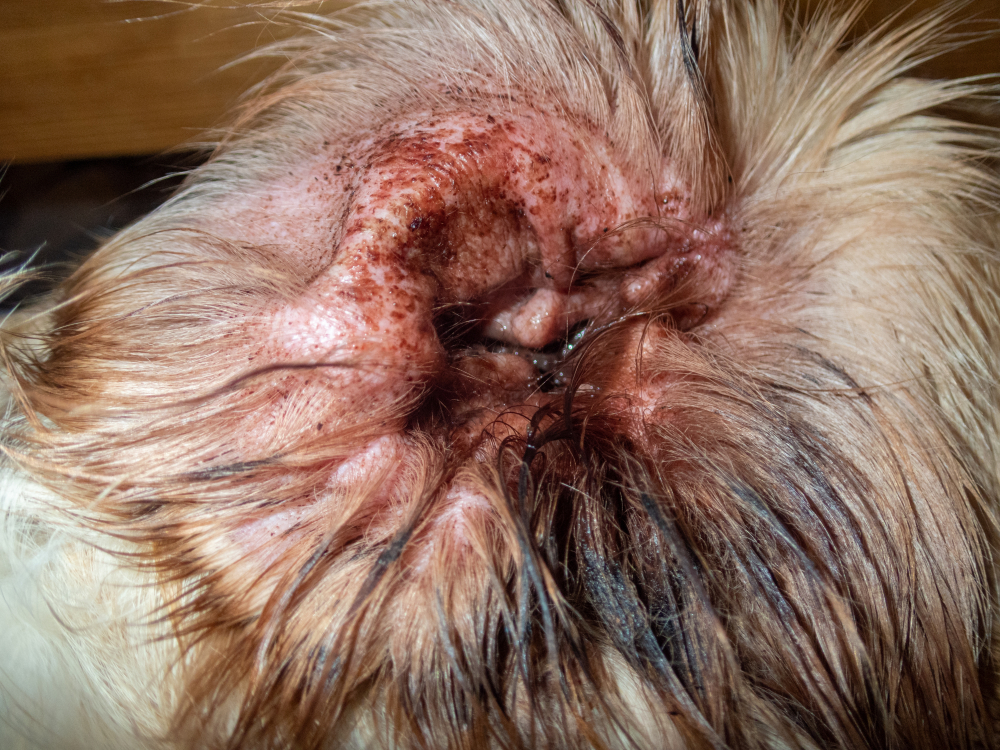
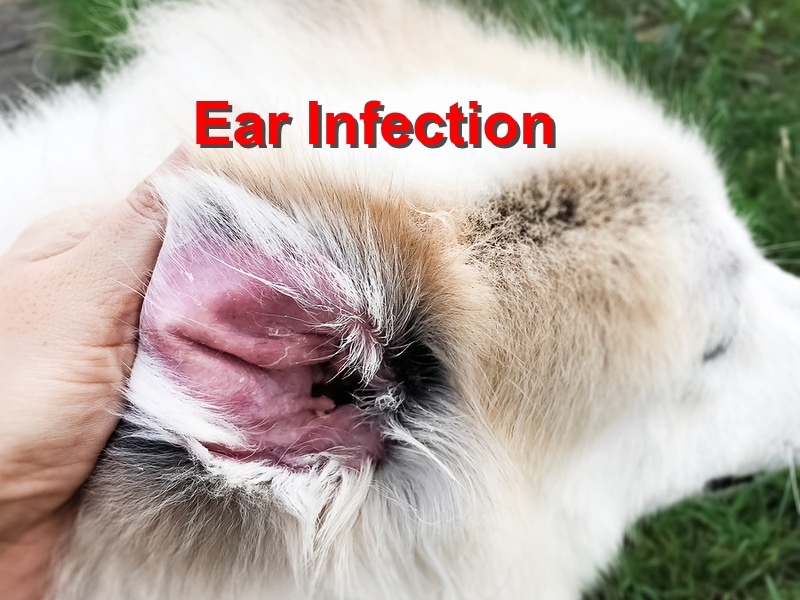
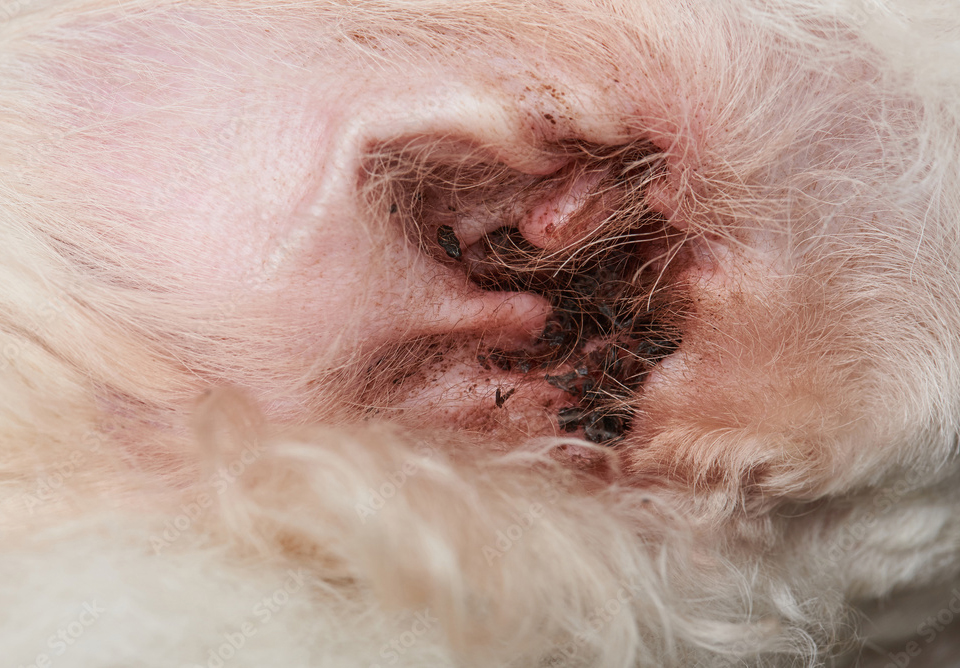
- Ear scratching
- Head shaking
- Tilting head
- Pawing or rubbing at the ear
- Brown, yellow or bloody discharge
- Odor in the ear
- Redness inside of the ear
- Crusts or scabs just inside the ear
- Balance and coordination issues
- Pain
- Facial paralysis
- Itchiness
- Crusting or scabs in the ears
- Dark discharge
- Redness and swelling of the ear canal
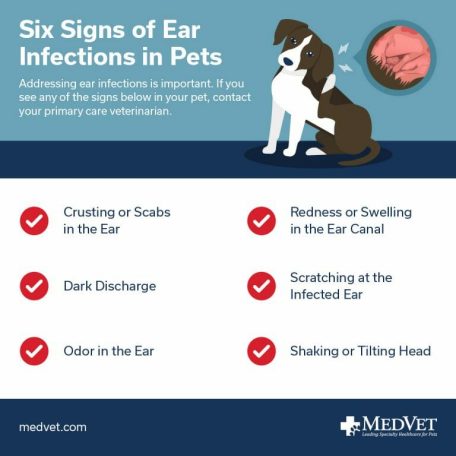
If your dog has any of these signs of an ear infection, it's important to contact your vet right away. Getting quick treatment for ear infections can help prevent more severe symptoms and reduce the chance of complications.
What are the treatment options for ear infections in dogs?

There are several treatment options for ear infections in dogs, depending on the severity and type of infection. Here are some common treatment options:
- Medicated ear cleanser: This is the most common treatment for ear infections in dogs. Your vet will give you a bottle of this topical ointment and instruct you on how to place it into your dog’s ear. Daily treatments with this cleanser usually clear up most ear infections.
- Oral antibiotics: Certain bacterial ear infections can be treated with oral antibiotics. Some antibiotics can treat dog ear infections caused by bacteria. These include Augmentin, Enrofloxacin, Cleocin, and Cefpodoxime.
- Anti-fungal ointments and oral medications: To treat dog ear infections caused by fungus, you can use antifungal drugs taken by mouth or ointments applied to the ear. Some examples are Sporanox, Miconazole, and Ketodan.
- Anti-inflammatory medications: For severe cases, the vet may give your pet anti-inflammatory meds or oral antibiotics.
- Steroid medication: Some dogs may require steroid medication as a treatment for an ear infection, although this is not very common.
To make sure your pet gets better, follow your vet's instructions and finish the treatment. Lapses or errors in treatment can prolong your dog's illness. To prevent ear infections in dogs, clean their ears regularly and well, in addition to treatment.
The Bottom Line
Yes, dog food can definitely cause ear infections. Allergies and poor nutrition compromise the health of your dog’s ears and leave them vulnerable to infection. Luckily, with a hypoallergenic, species-appropriate diet you can support healthy ear function.
Watch for signs of food sensitivities, like itchy skin or chronic ear issues. Work with your veterinarian to pinpoint problem ingredients and determine the best diet. With careful attention to food and some preventative ear care, you can keep your dog’s ears healthy and infection-free.







